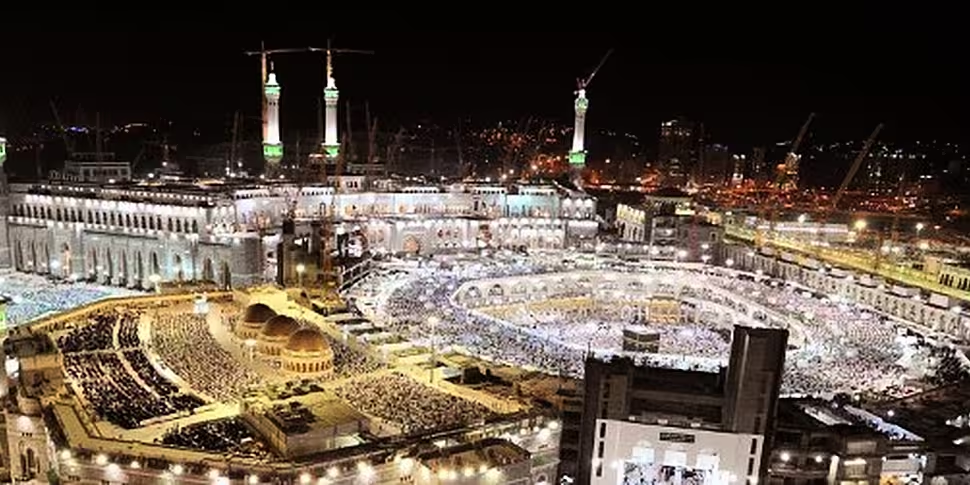Women in Saudi Arabia cannot drive cars on their own. Women in Saudi Arabia are not allowed to marry without the permission of their guardian.
Women there could only vote in municipal elections for the first time in December 2015.
In December 2014, authorities arrested two Saudi women who drove a car to the United Arab Emirates-Saudi Arabia border and detained them for 73 days.
They were subsequently released without charge.
Now, this country has a seat on the United Nations Commission on the Status of Women (CSW).
The body is dedicated to the promotion of gender equality and the empowerment of women.
Ireland was one of the countries that voted in that election - but Foreign Affairs Minister Charlie Flanagan says he will "not publicly disclose" how the country voted, as is the norm for such votes.
Ireland has had a long history at the CSW, with the country holding chairmanship of the group in March.
But how did Saudi Arabia get a seat on a council that looks to empower women?
Ability to vote
As recently as 2015, the United Nations itself said of Saudi Arabia: "Many recognize that there is a long road ahead, and many challenges remain around women's participation in public space.
"Reports suggest that 130,637 women registered to vote, compared to more than 1.3 million men, and Saudi women won 20 of the 2100 municipal seats."
Women imprisoned
The group Human Rights Watch says just days ago, a 29-year-old woman named Mariam al-Oteibi fled abusive family members, but was taken by authorities and jailed.
She is currently in Buraida Prison in al-Qassim.
While on April 10th, 24-year-old Dina Ali Lasloom attempted to flee to Australia from Kuwait to escape restrictions imposed by her family.
She was also returned to Saudi Arabia from a Manila airport in the Philippines.
According to a Saudi official, she is now in a detention centre facing indefinite detention or possible forced return to the family she fled.
"Discrimination in both law and practice"
Human Rights Watch says: "Saudi Arabia has made marginal improvements on women’s rights in recent years, primarily in employment and access to higher education, but such changes have been hindered or even nullified because authorities have allowed the male guardianship system to remain largely intact, enabling men to maintain control over female relative’s lives."
It adds: "The Saudi government's seat on the commission should not stop it from standing with Saudi women seeking to empower themselves.
"It can start by calling on Saudi Arabia to release Mariam al-Oteibi and Dina Ali Lasloom, and guarantee their right to travel freely, live independently, and make decisions for their own lives, and then urge the government to finally deliver on its promise to take holistic steps to scrap the guardianship system altogether."
British Prime Minister Theresa May meets King Salman bin Abdulaziz al Saud of Saudi Arabia in Manama, Bahrain | Image: Stefan Rousseau/PA Wire/PA Images
In its annual report for 2016/2017, Amnesty International found: "Women faced discrimination in both law and practice and were inadequately protected against sexual and other violence."
"The authorities maintained tight restrictions on freedom of expression and repressed dissent. They harassed, arrested and prosecuted critics, including writers and online commentators, political and women’s rights activists".
It says that in November 2016, 13 women were put on trial at the Specialised Criminal Court on charges relating to participation in protests in the city of Buraydah.
It also notes: "Women remained legally subordinate and inferior in status to men in relation to marriage, divorce, child custody and inheritance, and could not access higher education, take paid employment or travel abroad without the approval of their male guardian. Women also remained banned from driving."
It says that while a 2030 economic reform plan included goals to increase the participation of women in Saudi Arabia's workforce, "no legal reforms or other measures needed to achieve these aims appeared to have been initiated by the end of the year".
German Chancellor Angela Merkel greets a Saudi delegation member at the start of talks with the Crown Prince and Defense Minister of Saudi Arabia Mohammed bin Salman bin Abdulaziz al-Saud at the G20 Summit in Hangzhou, China | Image: Bernd von Jutrczenka/DPA/PA Images
However the Saudi justice minister ruled in May that women must be given a copy of their marriage certificate, which is required in case of legal disputes between spouses.
The Shura Council also debated a proposed law that would allow women to obtain a passport without the approval of a male guardian.
In August, an online Twitter campaign entitled 'Saudi women demand the end of guardianship' prompted tens of thousands of women to express opposition to the system of male guardianship.
Activists reported that by September an estimated 14,000 Saudi Arabian women had signed an online petition calling on King Salman to abolish the system.
On December 11th last year, Malak al-Shehri was detained and interrogated after she posted a picture of herself on social media without an abaya - a full-length garment.
She was released on December 16th, but Amnesty says her legal status remains unclear.











